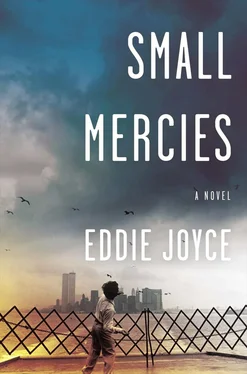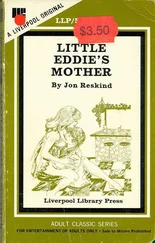“I think you’re forgetting other times.”
“It doesn’t matter. What’s up?”
“Listen, do you remember how we used to do the pool? I’d pick a team, then you’d pick a team, then Franky, then Bobby. Just the one entry. So I was thinking that this year, we’d go back to that.”
“To be clear, you’re calling me about the Cody’s pool?”
“Yeah.”
“Dad, I don’t have time for this right now.”
“Peter, I just need you to pick one team. It’ll take five seconds.”
He looks down at the sheet.
“You have the West regional.”
“Just give me the one seed. I haven’t watched a game all year.”
“But that’s Duke.”
“So?”
“We hate Duke.”
“I don’t hate Duke.”
“Well, Bobby did. You can’t pick Duke.”
“Okay, Dad. Who’s the two seed?”
“San Diego State.”
“Jesus Christ, San Diego State? No way a team from San Diego makes the Final Four. Who’s the three seed?”
“UConn.”
“Fine, give me UConn. Big East team, been there before. Good coach.”
Michael fills in the second entry.
“Good. Thank you, Peter.”
“Okay, Dad. Gotta run.”
He starts to say good-bye, but Peter has already hung up. He puts the receiver back in its cradle. He inspects the sheet again: a 3 seed and a 4 seed. He will get Tina’s pick next, stop by their house on his way to the Leaf. And Franky’s pick on his way to Cody’s later.
Was it possible that he’d only called Peter three times in fifteen years? Maybe. Gail usually did the calling, handled the chitchat. Still, he talked to Bobby all the time when he was alive. He talks to Franky frequently, even though there have been rough patches over the years. But he’s never been able to talk to Peter, they’ve never been able to connect as adults. He never needed anything from Michael, nothing of substance anyway. Bobby and Franky were both like him in some respect, wanted the same things. Peter was different. He never wanted his parents’ life.
A son who didn’t want to be like his father. Michael understands that.
* * *
From his bedroom, Michael can smell his mother cooking his favorite dish: braised lamb shanks with garlic, onions, and tomatoes. If he missed one thing during his time in the army, it was his mother’s cooking. But since he came home six weeks ago, twenty pounds lighter than when he left, his mother has been trying to fatten him up. Lamb shanks used to be a rarity, once a month maybe, if Enzo had a few left over on the days when he was lucky enough to get lamb. By Michael’s count, this will be the tenth time they’ve had lamb since he came home; he’s getting a little sick of it.
He’s tried to explain to them, several times, that he was never in harm’s way. Not really. He was only in Vietnam for six months, only discharged his weapon twice; neither situation escalated into a full-blown engagement. He’d thought the army was going to be an efficient, egalitarian organization, but it was like anything else run by men: subject to their own predilections and peccadilloes. One time, his transfer to Vietnam got postponed because the base had a baseball game coming up and he was their star third baseman. One time, he mentioned to his CO that he was an only child and his name got moved from one list to another. Mostly, things hadn’t really heated up until he was gone. They were heating up now. Boys were starting to get killed. He’d been lucky in a way, to serve so early, even though it hadn’t felt like it at the time.
His parents will not listen, do not care. They know only that their beloved boy is safely home. His father has even abandoned his usual waking jab in favor of a gentle shake. Some mornings, Michael even waves his father off, tells him he’ll meet him at the shop, falls back to sleep. Enzo is puzzled, but lets it go. His boy is home, has served his country, is entitled to a few indulgences. Besides, Michael’s presence at the shop is superfluous. In his absence, Enzo hired a young boy, Enzo Annunziata, to do the deliveries and he doesn’t have the heart to let him go now that Michael is home. So old Enzo handles the cutting and the counter and young Enzo makes the deliveries and Michael sits there, watching them scurry around and wondering how it’s possible that he went halfway around the world, spent two years in three different countries, and came home to find that nothing had changed.
Not true. The world has changed. Michael has changed. But his parents have not changed. Their love for him, which was always stifling, is now suffocating. He doesn’t miss the army — the food was terrible, there was too much bullshit — but he misses aspects of it: the camaraderie, the sense of purpose. He missed being home too. Missed his parents, missed his friends, missed the kindhearted but streetwise sensibilities of Staten Islanders. He did not miss the shop.
He hears his mother call up to him, tell him in Italian that dinner is ready.
“ Il tuo preferito, ” she adds. His Italian is rusty, but he knows this one.
Your favorite.
* * *
Tiny picks him up after dinner. It’s the night before Thanksgiving, the biggest night of the year. Michael has been itching for a night out since he got home.
“Where we headed, Tiny?”
“There’s a big party over at the Feeney house. Jerry is shipping out next week.”
The Feeneys are a well-known clan on the Island. Seven boys, all good athletes, all tough as nails. A little crazy. They live in a sprawling wreck of a Victorian at the top of Forest Avenue. The father is a living legend, got the Silver Star in WWII, is some kind of a big shot in the fire department.
“Is that the one we played against?”
“No, that was Ryan. I think he’s in the army now.”
“Who was the lunatic who got thrown out of Curtis for stealing the principal’s car and taking it on a joyride?”
“I think that was John. Maybe Tommy.”
Michael opens the window, smells the ocean.
“Laura Gentile’s gonna be there,” Tiny says.
“Jesus Christ, Tiny. Give up the ghost.”
Tiny never got in Laura’s pants before he went away to college, but he hasn’t stopped trying. Every holiday, every summer break, he renews his efforts, never mind that he has a steady girl back at school.
“Ye of little faith.”
“No man is getting in there until a priest says he can.”
“We’ll see. I’m close.”
Michael looks over at his friend, wonders how so much drive and determination could be packed into so slight a package. Tiny’s nickname actually fits him; he is short and thin. He is handsome, in an almost impish fashion, and does not lack for confidence. The teasing and ridicule that often plague short men is not a problem for Tiny. As soon as he steps onto the field or the court or the diamond, all the jokes stop. He is fast and fearless and he delights in making larger men look ridiculous.
Michael knows; he was one of them.
Before the first day of freshmen football practice, Michael and a few other guys were mocking Tiny, calling him a midget and asking him when he was due back at the North Pole. Then practice started and no one could touch him, never mind tackle him. They played football together for four years and somewhere along the way, they became fast friends. Tiny was quicksilver in the open field and Michael blocked as hard as he could to get him there. As a senior, Tiny was first team all-city at halfback. His success garnered perks: a football scholarship, write-ups in the Advance, the attention of attractive young ladies, and a measure of fame on the small-town Island.
Michael isn’t envious of Tiny, not exactly, but he wishes he had some of his confidence, especially with girls. The army made him a man, in more ways than one, but he could really use a bona fide girlfriend. He needs something to distinguish the long, silent days that languish between shakes on his shoulder.
Читать дальше












